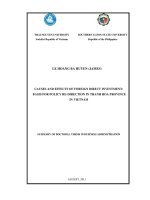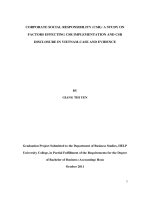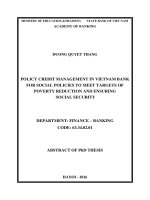Assessment of implementation of government strategies in improving competitiveness of telecommunication companies in vietnam basis for policy redirection using PEST analysis and solution
Bạn đang xem bản rút gọn của tài liệu. Xem và tải ngay bản đầy đủ của tài liệu tại đây (231.26 KB, 14 trang )
SUMMATION THESIS BY PHAN THẾ HÙNG
PREFACE
In the past years achievements of the ICT sector has made a significant, bringing
great benefit to society. The number of telecom business increased, the dynamics of the
telecom
business
increased,
telecommunications
cost
reduction,
quality
telecommunications services are gradually improving. However, with the development many problems arising in this industry:The dispute service; The exclusive license; The
human problem; The issue of restructuring of state-owned corporations; The issue of
managing telecommunication infrastructure; Management services, management
These issues are directly related to government policy and regulations, development
policies in recent years, as well as issues of economic, social, technological ...
The assessment of the macroeconomical impact of government policy through the
evaluation of the implementation of government policy in the competitive
telecommunications business model with PEST is an essential need and then finding make
recommendations for policy changes.
Name of thesis: " ASSESSMENT OF IMPLEMENTATION OF GOVERNMENT
POLICIES IN DEVELOPING COMPETITIVENEES OF TELECOMMUNICATION
COMPANIES IN VIETNAM: BASIS FOR POLICY REDIRECTION USING PEST
ANALYSIS “
The structure of dissertation includes 5 chapters.
CHAPTER I: INTRODUCTION
1.1. BACKGROUND OF STUDY
In recent years, many national scholars and international researchers are interested in
competitive environment issues and the competitiveness of economic sectors with the
different levers. In the framework of the technical assistance project for assessing the
situation and reviewing the system of legal documents in accordance with international
commitments to the WTO, a number of studies were carried out such as Report on
competitive telecommunications (VNCI), the appropriateness of specialized legal
documents (MUTRAP).
However, so far in Vietnam there are not any economic researches studied fully and
systematically in depth the role of the state for improving the competitive environment for
telecommunications companies.
Based on an analysis combined with systematic analysis of statistics, the study shows
the general problem of the competitive environment in the telecommunications sector,
analyzes the situation and gives some major solutions to improve the competitive
environment of telecommunications services in Vietnam in the future.
1.2. STATEMENT OF THE PROBLEM
To implement this study, the author answered the following questions:
-
To evaluate the competitiveness of the telecommunications company in
Vietnamn.
1
-
To determine the impact of the policies of the state on the development and
competitiveness of telecommunications industry in Vietnam.
-
To draft policies that will further improve the competitiveness of the
telecommunication industry in Vietnam.
1.3. SIGNIFICANCE OF THE STUDY
Results of this study will showed that the level of implementation of government
policies for the development of competitive telecommunications businesses in Vietnam.
This study will clarify somewhat the impact of the policy as well as the macro factors
affecting the development of competitive telecommunications businesses, so we can choose
the more appropriate solution.
The study will help policy makers to have a clearer view of the telecommunications
activities, the macroeconomic factors as well as the impact of these factors to the
competition in the telecommunications business. Since then there is a reasonable
adjustment, the right time ... to ensure harmony between the interests of the state, business
and civil society in terms of development technology and ICT services, international
economic integration.
1.4. SCOPE AND LIMITATION OF THE STUDY
Some state macroeconomic policies, especially the operation of information and
communications.
The level of implementation of government policies for the development of
competitive telecommunications corporations Vietnam:
Group of Vietnam Post and Telecommunications (VNPT); Viettel Corporation
(Viettel); Vietnam Multimedia Corporation (VTC); Sai Gon Poster Corporation (SPT)
Limitations of the study
As we know that competitive environment is very complex issues. There are still many
points which are inconsistent with each other both in Vietnam and in the world. Moreover
the market economy in Vietnam is still in the new phase formation with continuous
changes and mobilization. So, in the framework of the study limited by the review as well
as limited ability, the writer only focuses on issues related to the EXTENT OF
IMPLEMENTATION
TO
GOVERNMENT
POLICIES
IN
DEVELOPING
COMPETITIVENEES OF TELECOMMUNICATION COMPANIES IN VIETNAM
CHAPTER II: REVIEW OF RELATED LITERATURE AND STUDIES
2.1. REVIEW OF RELATED STUDIES
This section present of 9 literatures related to the topic.
2.2. THEORETICAL FRAMEWORK
Use model PEST to study the impact of these factors in the macro environment. The
factors that are: Political (Institutional-law); Economics (Economics); Sociocultrural
(Culture and Society); Technological (Technology)
2.3. CONCEPTUAL FRAMEWORK
From theory and definition in section 2.1 and 2.2, the framework of this thesis :
2
-
factors create competition.
Characteristics of the competitive environment in telecommunications business.
In terms of competitive actors
Considering the nature of competition
In terms of legal aspects and the impact of competitive economic development.
Considering the level of competition
CHAPTER III: METHODOLOGY
Research design
Research Secondary data are sourced from various government agencies, a number of
publications, and industry associations.
The primary data are from a survey of telecom companies. Content questions are designed
to rotate the level of implementation of government policies, these policies affect how
businesses.
Specifically, macroeconomic factors in each factor PEST model is reflected by the
influence of the elements: the laws, decrees, decisions ... specific programs. At the same
time determine the influence of these factors to the intrinsic factor in the
telecommunications business.
2. Description of reseach points
Measurement of the impact of eight factors on
Telecommunications enterprise : VNPT, Viettel, VTC, SPT
competetiveness between
For 4 factors P,E,S,T
stt
(Xi) Factors
Level of 1-10
P
1
Telecommunications law
2
ICT development policy in Vietnam 2010-2020
3
Management Policies
antidumping ...)
4
Policy, and the dynamics of government for procedures
for
business
registration
and
licensing
for
telecommunications activities.
unfair
competition
(antitrust,
E
5
Tax Policy for Telecommunications
6
The regulations in freight management, transparency and
transaction costs.
3
7
Investment Policy in Management application ITC
8
Land Policy to develop telecommunications infrastructure.
S
9
policies for human resource development and distribution
of human
10
public telecommunications policy
11
Inspection - inspection and sanction telecommunication
12
The average income, living conditions, lifestyle affecting
telecommunications development
T
13
state investment in telecommunications research and
development
14
Policy Research encouraging
telecommunication applications
15
The impact of information technology, internet and
business activities
16
. Integration of new technologies Such as 3G, 4G
the
development
of
In order to analysis, the results obtained from the questionnaire were entered into SPSS
spreadsheet.
3. Research Instrument
The researcher will use a questionnaire and document analysis as the main instruments
for data gathering. The questionnaires shall contain items to be asked to respondents with
questions.
Data gathering procedures
The study used both primary and secondary data to identify the factor affecting
competitiveness and access the level of competitiveness of enterprises.
Primary Data Collection Method
Primary data was collected through a survey with 04 Telecomunication enterprises
Vietnam with 600 samples. The survey was done in 8 weeks.
Secondary data collected from reports and studies in recent years.
4. Statistical analysis
4
The thesis analyzed using one-way ANOVA with Post Hoc Tests deep analysis to analyze
the differences in the impact assessment of the competitiveness of the elements P, E, S, T
between companies. Companies differ in the assessment factor P, E, S, T affects the
competitiveness of the alpha level of significance when testing the difference in less than
0:05 ANOVA. To analyze the differences between the companies assess the impact of these
factors on the ability to compete, the thesis using SPSS 16.0 software. In SPSS, the
company is said to be the difference in assessment PEST factors affecting competitiveness
when Sig> 0.05.
-
Assessing the impact of external factors (the components of P, E, S, T) to 08
elements within the Telecomunication enterprise: Enterprise Strategy; plans of
companies; Financial; Marketing; human resources; Research and Development;
equipment and technolog;The ability to cooperate in national and international;
-
Assessing the impact of external factors: the influence of this factor to the
competitiveness of the telecommunications business
-
Integrated components of P, E, S, T to evaluate these factors.
CHAPTER IV: PRESENTATION, ANALYSIS AND INTERPRETATION OF DATA
A.
GENERAL INTRODUCTION:
-
The formation telecommunications authorities of the government.
-
Developmental Process of Vietnam telecommunications
-
Ministry of Information and Communication state management agencies of
Vietnam's telecommunications.
-
Orientation telecommunication development
-
A number of documents relating to Telecommunications Competition last 5 years.
B.
ANALYSIS OF MACRO FACTORS AFFECTING THE MARKET
COMPETITION IN TELECOMMUNICATIONS VIETNAM (PEST MODEL
USED).
1. Political factors, institutions, government legislation affecting the market
competition in telecommunications
The institutions and laws of the state of the competitive telecommunications business in
Vietnam.
-
System for telecommunications law
-
The cooperation between the relevant authorities in coordinating the competition
management, timely detection and treatment of manifest violations of competition
law and unfair competition
-
Make connections and share telecom infrastructure
Assessing the implementation of government policies for the development of
5
telecommunications competition
Analysis of results surveys for Policy elements (P)
For P, surveys on 4 issues:
- Telecommunications law (x1)
- ICT development policy in Vietnam 2010-2020 (x2)
- Management Policies unfair competition (antitrust, antidumping ...) (x3)
- Policy, and the dynamics of government for procedures for business registration and
licensing for telecommunications activities (x4)
Correlations
The impact of the policies of the state on the development and competitiveness of
telecommunications industry in Vietnam.
a9p
a9p
x1
Pearson Correlation
1
Sig. (2-tailed)
N
x1
Pearson Correlation
Sig. (2-tailed)
N
x2
x3
x4
x2
x3
x4
.609**
.367**
.704**
.481**
.000
.000
.000
.000
570
564
570
565
570
.609**
1
.445**
.600**
.457**
.000
.000
.000
.000
564
564
564
559
564
.367**
.445**
1
.390**
.241**
Sig. (2-tailed)
.000
.000
.000
.000
N
570
564
570
565
570
**
**
**
1
.454**
Pearson Correlation
Pearson Correlation
.704
.600
.390
Sig. (2-tailed)
.000
.000
.000
N
565
559
565
565
565
**
**
**
**
1
Pearson Correlation
.481
.457
.241
.000
.454
Sig. (2-tailed)
.000
.000
.000
.000
N
570
564
570
565
570
**. Correlation is significant at the 0.01 level (2-tailed).
2 . Economics (Economics)
The economic situation in Vietnam in 2012, socio-economic indicators in 2013
- Economic growth low
- Aggregate demand and low inflation
- Macroeconomic stability firmer
- The main targets of 2013
Investment policies, tax incentives and government investment in infrastructure and
telecommunication services to promote effective competition in the telecommunications
6
business.
- Investment policy and government investment in infrastructure and
telecommunication services to promote effective competition in the
telecommunications business
- Government investment in infrastructure and telecommunication services to
promote effective competition in the telecommunications business.
- Tax Policy
The economic integration and participation of many economic sectors to develop
competitive telecommunications.
- The international economic integration
- Implementation of the equitization of State enterprises, telecom services has shifted
sharply from monopoly to competitive business telecommunications services.
Analysis of results surveys for Economic elements (E)
For E, surveys on 4 issues:
- Tax Policy for Telecommunications (x5)
- The regulations in freight management, transparency and transaction costs (x6)
- Investment Policy in Management application ITC (x7)
- Land Policy to develop telecommunications infrastructure (x8)
Correlations
The impact of the Economics (Economics) on the development and competitiveness of
telecommunications industry in Vietnam.
a9E
a9E
x5
Pearson Correlation
1
Sig. (2-tailed)
N
x5
x6
x7
x8
Pearson Correlation
x6
.548
**
.000
.769
.000
x8
**
.744**
.000
.000
.256
570
570
570
570
570
.548**
1
.509**
.248**
.432**
.000
.000
.000
570
570
570
1
**
.599**
.000
.000
Sig. (2-tailed)
.000
N
570
570
**
**
Pearson Correlation
x7
**
.769
.509
.336
Sig. (2-tailed)
.000
.000
N
570
570
570
570
570
**
**
**
1
.259**
Pearson Correlation
.256
.248
.336
Sig. (2-tailed)
.000
.000
.000
N
570
570
570
570
570
**
**
**
**
1
Pearson Correlation
.744
.432
.599
.000
.259
Sig. (2-tailed)
.000
.000
.000
.000
N
570
570
570
570
570
**. Correlation is significant at the 0.01 level (2-tailed).
7
1. SOCIAL FACTORS (S)
Workforce ITC with the development of the Telecommunications business.
- Situation of human resources and human resource communications
- ICT Workforce
Implementation of programs of public telecommunications and telecommunications
development
Analysis of results surveys for Social elements
For S, surveys on 4 issues:
- Policies for human resource development and distribution of human (x9).
- Public telecommunications policy (x10)
- Inspection - inspection and sanction telecommunication (x11)
- The average income, living conditions, lifestyle affecting telecommunications
development. (x12)
Correlations
The impact of the SOCIAL on the development and competitiveness of telecommunications
industry in Vietnam.
a9s
a9s
x9
Pearson Correlation
1
Sig. (2-tailed)
N
x9
x10
Pearson Correlation
570
570
570
570
1
**
**
.389**
.000
.008
.000
570
570
570
1
**
.325**
.000
.000
570
**
**
Pearson Correlation
Sig. (2-tailed)
N
.258**
.000
**
.000
.345
.000
570
.259
.259
x12
**
.000
N
Pearson Correlation
x11
**
.000
.000
N
x12
.454
.454
Sig. (2-tailed)
Sig. (2-tailed)
x11
570
x10
**
.187
.187
.000
.110
.628
570
570
570
570
570
.345**
.110**
.628**
1
.234**
.000
.008
.000
.000
570
570
570
570
570
.258**
.389**
.325**
.234**
1
Sig. (2-tailed)
.000
.000
.000
.000
N
570
570
570
570
Pearson Correlation
570
**. Correlation is significant at the 0.01 level (2-tailed).
2. TECHNOLOGICAL FACTORS AFFECTING THE TELECOMMUNICATIONS
MARKET (T).
The impact of technology convergence factors for the telecommunications sector.
The impact of factors of state investment in research and development competitive
8
telecommunications
- Policies to encourage investment in research to develop telecommunication
applications
- The large corporations and government enterprises have investment programs
research and development tech for ICT.
Analysis of results surveys for Tenical elements (T)
For T, surveys on 4 issues:
- state investment in telecommunications research and development (X13)
- Policy Research encouraging the development of telecommunication applications
(x14)
- The impact of information technology, internet and business activities (x15)
- Integration of new technologies Such as 3G, 4G (x16)
Correlations
The impact of the TECHNOLOGICAL on the development and competitiveness of
telecommunications industry in Vietnam.
a9t
a9t
x13
Pearson Correlation
1
.524
Sig. (2-tailed)
Pearson Correlation
Sig. (2-tailed)
x15
x16
**
x16
**
.472**
.000
.000
.453
.000
570
570
570
570
570
.524**
1
.028
.553**
.281**
.503
.000
.000
.000
N
x14
x15
.359
.000
N
x13
x14
**
570
570
570
570
570
.359**
.028
1
.105*
.455**
Sig. (2-tailed)
.000
.503
.012
.000
N
570
570
570
570
570
**
**
*
1
.233**
Pearson Correlation
Pearson Correlation
.453
.553
.105
Sig. (2-tailed)
.000
.000
.012
N
570
570
570
570
570
**
**
**
**
1
Pearson Correlation
.472
.281
.455
.000
.233
Sig. (2-tailed)
.000
.000
.000
.000
N
570
570
570
570
570
**. Correlation is significant at the 0.01 level (2-tailed).
*. Correlation is significant at the 0.05 level (2-tailed).
General summary of enterprises
Correlations
A9
A9
Pearson Correlation
P
1
E
.345
**
S
.556
**
T
.357
**
.462**
9
Sig. (2-tailed)
.000
N
P
Pearson Correlation
E
S
.000
570
559
570
570
570
1
.114**
.098*
.151**
.007
.020
.000
559
559
559
1
**
.248**
.002
.000
.000
N
559
559
**
**
.556
.114
.132
Sig. (2-tailed)
.000
.007
N
570
559
570
570
570
**
*
**
1
.156**
Pearson Correlation
T
.000
.345**
Sig. (2-tailed)
Pearson Correlation
.000
.357
.098
.132
Sig. (2-tailed)
.000
.020
.002
N
570
559
570
570
570
**
**
**
**
1
Pearson Correlation
.462
.151
.248
.000
.156
Sig. (2-tailed)
.000
.000
.000
.000
N
570
559
570
570
570
**. Correlation is significant at the 0.01 level (2-tailed).
*. Correlation is significant at the 0.05 level (2-tailed).
C. ACHIEVEMENTS, RESTRICTIONS AND CAUSE
1.
THE ACHIEVEMENTS
2. RESTRICTIONS AND CAUSE
2.1 Restrictions
Still have achieved concrete results, the first step is to build a competitive
environment enabling the telecom business activities but also practical limitations exist
which affect the development of the telecommunications market communication.
2.2 Cause of the limitations mentioned above.
- Problem assigning responsibility and coordination mechanism among government
agencies concerned are still inconsistent and lacks consistency. The capacity of the state
management agencies can not meet the requirements of new management methods, is lower
than required to facilitate and support business development.
- The law to not keep the development of business activities, the text was issued too
much and fast, sometimes inconsistent, has caused confusion for businesses in the
recognition and response treatment in accordance with the law change. The regulation is
too complex or requires more explanation in the text, or the more difficult to handle
specific issues can lead to inconsistencies in the methods of dealing between the
authorities, the local and state agencies.
- The lack of synchronization, inconsistent, inappropriate regulations, especially documents
directly related to the operation of law firms such as land tenure, legislation funding , labor law,
tax law, especially tax and how tax ... has yet to be overcome, especially in the field of
telecommunications business.
10
- The management of service quality has not kept pace of technology development and market,
no sanctions are strong enough to protect the user about the quality of services;
- The competition between the telecom business is still largely spontaneous, looking at the
market management perspective, the regulatory role of the state management agencies are still
tight.
CHAPTER V: CONCLUSIONS AND RECOMMENDATIONS
With the transfer of power from the telecommunications monopoly to the market
mechanism, the State has an open door policy so adamantly telecommunications industry,
this has changed the face of the telecommunications industry, bringing air next fierce,
reduced rates, improve service quality, benefiting people and businesses. The growth rate
of telephone subscribers in more than 10 years is high (average quan36% / year), making
Vietnam one of the countries with growth rates highest in the world telecommunications.
However, the development process requires a legal system requires significant changes
to management and promote the telecommunications market in terms of new development,
especially during the period when the level of competition even higher with the
participation of the foreign investors in Vietnam's commitments in the WTO.
Based on the evaluation of the elements P, E, S, T to the extent of Implementation in
Developing competitivenees to Government policies of telecommunication companies in
Vietnam, to determine the factors that impact strengths, weaknesses, and thereby causes
made a number of recommendations and solutions contribute to the development of
Vietnam's telecom:
Recommendation
Telecommunications
Policy.
Action
- Additional guidance,
telecommunications law;
detailed
regulations
for
- Create favorable conditions for enterprises in the
process of finalizing telecom licensing records;
- The amount of planning, enterprise quality
management to provide telecom infrastructure, telecom
services, ... Create telecommunications business
environment fair for all businesses.
- Requires agencies to submit reports industry market
information on a regular basis, eg quarterly and annual
reports
with
more
detailed
analysis;
11
- Prepare and publish quarterly reports including
telecommunications clarify trends and industry
activities to achieve the objectives of the Government.
Transparency
in
- To issue additional guidance on connectivity,
including:
o Specifying the fair treatment (regardless);
o
Complete instructions concerning behavior:
misuse of information;
operations
management,
regulate
o The cost of connectivity and logical behavior
delayed service providers, and subject to the
administrative regulations to prevent and correct such
behavior.
- Respect the right to set rates of telecommunications
companies and Internet; adjusted rates of existing
services;
- Adjust the level of fees, license fees, use of
telecommunications and Internet resources;
telecommunications
activities.
- Continued development of licensing criteria, apply
common concepts permits to increase competition;
- Detect and handle the expression of unfair competition
in business telecommunications services is not
effective;
- Deployment utility telecommunication services for
effective rural and remote, border and island areas;
Shared
-
Allocating telecommunications resources, especially for
the frequency band higher commercial will be done
primarily through the examination forms and auction;
-
Promote the use of common infrastructure across
sectors such as telec6ommunications, electricity,
transport, as well as the increased use of public
telecommunication works between the telecom
business.
-
Increase funding foreign investment to develop
infrastructure,
telecommunications
engineering;
infrastructure of the
industry
The issue of human - Ministry of Communications and Information propose
and
organizational
specific, if the name of telecom inefficient operation,
Ministry of Information and Communications to
12
structure
of
withdraw the license of the enterprise, or restructuring
state-owned enterprises in the form of wax enter (such
as EVN Telecom to Viettel transfer), retaining only
those businesses actually operating capacity;
the
enterprise.
Development
science
technology
-
The authorities have plans for equitization of
enterprises, for example, up to 100% foreign Viettel
state (as related to national security), other businesses
such as VNPT, the state should only account for 51 %.;
-
Restructuring the corporations and domestic
corporations such as VNPT, VTC ...;
-
Policies to improve the quality of human resources in
the corporate telecommunications; Support training
programs and innovative teaching ICT.
of - Encourage free access to all technologies ICT;
and - Encourage and support technological development ICT
in the country;
-
Government funding for research theory ICT
-
Government funding for technical training, research &
development (R & D) ICT.
13
Published works
1. Phan Thế Hung. Factors affecting competitiveness of telecommunication enterprises
Corporate finance magazine. N0 8- 2013
14









